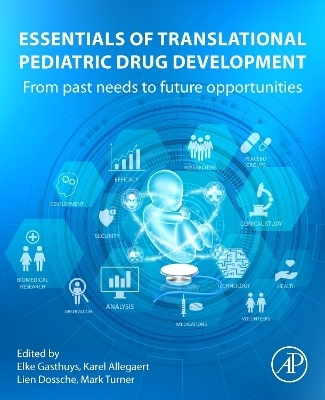
Essentials of Translational Pediatric Drug Development
Academic Press Inc (Verlag)
978-0-323-88459-4 (ISBN)
- Titel z.Zt. nicht lieferbar
- Versandkostenfrei
- Auch auf Rechnung
- Artikel merken
Despite the broad consensus that children merit the same quality of drug treatment as any other age group, children remain frequently neglected during drug research and development. Even with the adoption of multiple legislations addressing this problem, the lack of efficacy and safety data of marketed as well as newly developed drugs still remain in the pediatric population.
Elke Gasthuys is a Postdoctoral researcher at Ghent University, focusing on advanced modelling and simulations tools (PopPK/PD, PBPK, Systems biology) within drug research. Her main focus lies within the fields of inflammatory bowel disease; cystic fibrosis and enuresis, with special emphasis on the pediatric population. Her PhD thesis focused on developing a juvenile conventional piglet model at the Faculty of Veterinary Sciences, Ghent University, Belgium. Her research project was embedded within a broader research project (SAFEPEDRUG), aiming to improve pediatric drug research by integrating juvenile animal models and modelling and simulation tools to adapt pediatric clinical trial designs. Karel Allegaert is a pediatrician-neonatologist and clinical pharmacologist, appointed as Professor at KU Leuven, Belgium and as senior clinical consultant at Erasmus MC Rotterdam, the Netherlands. His main clinical research focuses on perinatal and developmental pharmacology. This includes active involvement in clinical studies, as well as educational and consultancies to different stakeholders, like authorities and industry. He is an author, reviewer and editor for a broad range of journals and textbooks in the fields of clinical pharmacology and pediatrics. These activities have resulted in relevant awards like the Galenus clinical researcher award (Belgium, 2009) for neonatal clinical pharmacology research and an appointment as ordinary member of the Royal Academy of Medicine, Belgium (2015). Lien Dossche is a full-time academic staff member at Ghent University, focusing on clinical activities as a Pediatrician and clinical research. After obtaining a medical degree at Ghent University in 2012, she started her specialization in Pediatrics at the Ghent University Hospital. Following her training as a Pediatrician, she completed a fellowship in Pediatric Nephrology at the Great Ormond Street Hospital in London. Since March 2015, she has combined her clinical activities with translational clinical research as a PhD candidate, focusing on the use of desmopressin in children with enuresis. She is a member of the IPNA (International Pediatric Nephrology Association), the ESPN (European Society of Paediatric Nephrology) and the ESPN Working Group on CAKUT/UTI/Bladder Dysfunction. Mark Turner is a Professor of Neonatology and Research Delivery at the University of Liverpool, UK. He has worked clinically for 30 years and has experience in many aspects of pediatric drug development including excipients, formulations, drug safety, and development and implementation of Pediatric Investigation Plans. He has led Phase 0 (microdosing) through Phase 3 studies. Currently, he co-leads European and international initiatives that promote a strategic approach to pediatric drug development through the development of research standards and infrastructure for clinical trials networks. He works in public private partnership with industry, regulators, academia, and advocates for babies, children, young people and their families. He was elected as an Honorary Fellow of the Faculty of Pharmaceutical Medicine.
Section 1: From past to current needs in pediatric drug research
1. Preface: overview of pediatric drug development and pharmacovigilance
2. Historical perspective
3. Parents' and children's needs in the drug development process
4. The needs from the regulatory authorities’ perspective – current status and worldwide initiatives
5. Optimal pediatric therapeutic development – the partnership between patients/families/industry and academia: the pharmaceutical industry’s perspective
6. The needs, challenges and opportunities from the academic researchers’ perspective
7. The needs from a health care provider’s perspective
Section 2: Designing pediatric drug research: from bench to bedside and back
8. Application of in vitro models
9. Application of preclinical juvenile animal models
10. Application of pediatric adapted modelling and simulation approaches
11. The promise of omics approaches for pediatric drug development
12. Generation and interpretation of big data in pediatric drug development
13. Investigational Medicinal Product considerations in pediatric clinical drug trials
14. Co-designing pediatric clinical trials with multi-stakeholders: a step by step approach
Section 3: Improving the performance of pediatric drug research: big changes start with small steps
15. Principles of performing pediatric clinical drug trials
16. Regulatory considerations in the design and conduct of pediatric clinical trials
17. Ethical considerations in the design and conduct of pediatric clinical trials
18. Performing clinical drug trials in acute and critically ill neonates and children
19. Performing clinical drug trials in children with a rare disease
20. Policy of pediatric oncology drug development
21. Practice of pediatric oncology drug development
22. Pediatric drug formulations
23. Worldwide network initiatives in improving pediatric drug research
24. The patients’/parents’ voice within pediatric drug research
25. Pediatric drug development issues during public health emergencies
Section 4: Future perspectives in pediatric drug research: the road to better drugs for children
26. Future of pediatric drug research from different stakeholder perspectives
| Erscheinungsdatum | 22.08.2024 |
|---|---|
| Verlagsort | Oxford |
| Sprache | englisch |
| Maße | 191 x 235 mm |
| Gewicht | 450 g |
| Themenwelt | Medizin / Pharmazie ► Medizinische Fachgebiete ► Pharmakologie / Pharmakotherapie |
| Medizin / Pharmazie ► Pharmazie | |
| Studium ► Querschnittsbereiche ► Epidemiologie / Med. Biometrie | |
| Technik | |
| ISBN-10 | 0-323-88459-8 / 0323884598 |
| ISBN-13 | 978-0-323-88459-4 / 9780323884594 |
| Zustand | Neuware |
| Informationen gemäß Produktsicherheitsverordnung (GPSR) | |
| Haben Sie eine Frage zum Produkt? |
aus dem Bereich


